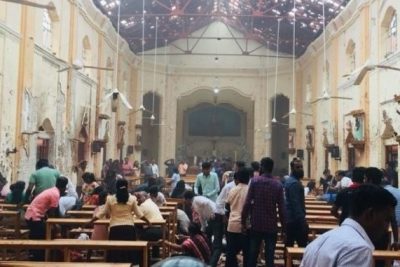Bloody Easter Sunday in Sri Lanka

Multiple suicide bombers reportedly were behind deadly attacks on four hotels, three Christian churches packed Easter Sunday worshipers, and an apartment complex.
Targeted sites were in Colombo, the Sri Lankan capital, Negombo on the west coast, and Batticaloa in the country’s east, a major commercial city.
According to authorities, the death toll is at least 293, including 35 foreign nationals and three police officers, over 500 others injured.
Sunday incidents were the deadliest in Sri Lanka since the 2009 Mulivaikal massacre, killing 40,000 Tamils during the final days of civil war begun in 1983, and devastating December 2004 Indian Ocean earthquake and tsumani.
It was one of the most disastrous in recorded history, affecting 14 East Asian countries, including Sri Lanka, killing an estimated 228,000, causing vast destruction.
It left around 2.5 million regional residents homeless, including coastal Sri Lankans, villages washed away to “build back better” with upscale development for privileged interests and tourism.
With everything gone, Sri Lanka had a blank slate to develop pristine coastal areas, scrubbed clean from ordinary people, shoved into grim inland camps, prevented from returning home.
Sri Lanka’s coast was transformed into an upscale tourist destination with luxury resort hotels and chalets at the expense of their former residents.
What ruling authorities hesitated doing earlier, mother nature did for them, followed by privatization of water, along with other public utilities and enterprises.
Around 70% of Sri Lankans are Buddhists, 12% Hindus, 10% Muslims, and 7% Christians, mostly Roman Catholics.
No claim of responsibility for the Sunday attacks was made so far. Until 2009, decades of war was waged between ruling authorities and Tamil Tigers, a period during which bomb blasts and other violence happened often.
Prime Minister Ranil Wickremesinghe held an emergency Sunday meeting with top Sri Lankan military and National Security Council officials.
A separate emergency session with parliament leaders convened on Monday. Around two dozen arrests were made, “local(s),” according to Wickremesinghe, investigators looking into whether detained individuals have “overseas links,” he said.
Defense minister Ruwan Wijewardene claimed all perpetrators were identified. They’ll be caught and prosecuted, he added.
A curfew was imposed until further notice. Social media and messaging apps were blocked on the pretext of preventing misinformation.
Secretary to the president Udaya R Seneviratne called it “a temporary measure” – a repressive action at a time Sri Lankans need freedom to communicate with relatives, friends, and others.
Security in Colombo and other cities was tightened, various holiday related events cancelled.
Local Christian groups complained of intimidation. Last year, clashes occurred between majority Sinhalese Buddhists and minority Muslims.
Sri Lankan Cardinal Malcolm Ranjith, archbishop of Colombo, asked ruling authorities “to hold a very impartial strong inquiry and find out who is responsible behind this act and also to punish them mercilessly, because only animals can behave like that.”
According to the National Christian Evangelical Alliance of Sri Lanka, there were scores of discriminatory, threatening, and violent incidents against minority Christians last year.
Easter Sunday attacks were clearly well planned and coordinated. Sri Lankan police and intelligence officials reportedly alerted ruling authorities about possible suicide incidents 10 days before the attacks.
The little known Islamist National Thowheed Jamath group was blamed for Sunday’s violence, no evidence cited proving it.
A Sri Lankan official reportedly said “the group…had not carried out any serious attacks before,” according to the NYT – raising an obvious red flag.
Was the group behind the Easter Sunday attacks, or are its members innocent patsies, falsely blamed for something they had nothing to do with?
This is a developing story, more on it when more information is known.
*
Note to readers: please click the share buttons below. Forward this article to your email lists. Crosspost on your blog site, internet forums. etc.
Award-winning author Stephen Lendman lives in Chicago. He can be reached at [email protected]. He is a Research Associate of the Centre for Research on Globalization (CRG)
His new book as editor and contributor is titled “Flashpoint in Ukraine: US Drive for Hegemony Risks WW III.”
http://www.claritypress.com/LendmanIII.html
Visit his blog site at sjlendman.blogspot.com.

